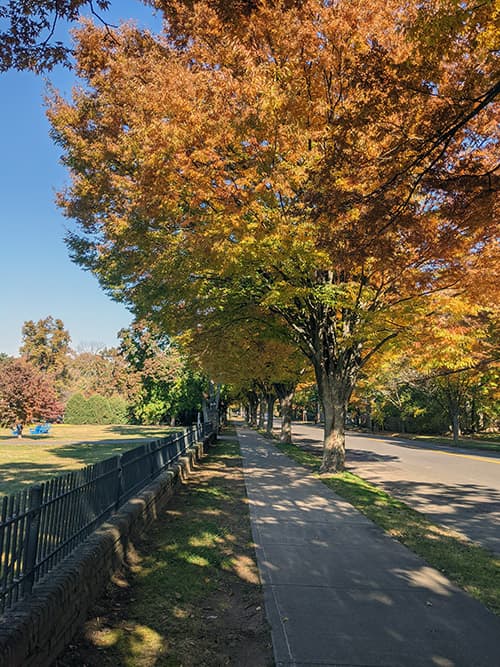The Aquinas Scholars Program at Albertus Magnus College
The Thomas Aquinas Scholars Program (TASP) was created for highly motivated, self-directed students in all disciplines to pursue self-designed projects as part of their College curriculum. This two-semester, 8-credit program is a unique opportunity for students to explore their intellectual passions through research, writing, and presentations in the context of a vibrant, supportive learning community either independently or in small groups.
"The Aquinas Scholars Program is an opportunity for you to direct and shape your education in ways that go beyond more traditional college courses. With the guidance of experienced faculty advisors, you will research and explore questions that are important to you. Not only does this allow you to bring your own interests into your educational experience, but in the process you'll learn research skills, and practice applying critical thinking in ways that will benefit you in your chosen profession."
Ross Edwards, Ph.D.
Faculty Mentor, Associate Dean for Academic Affairs, Associate Professor of History and Political Science
Eligibility & Requirements
To enter the program, students must:
- Be a sophomore, junior, or senior with a minimum 3.0 GPA
- Be nominated by a professor or faculty advisor (you are encouraged to seek nomination if interested)
- Submit a brief letter (1-2 pages) addressed to the Aquinas Scholars Program Director outlining reasons for wanting to participate in the program, academic goals, and discussion of why the candidate believes that he or she is suited for the program.
- Interview with the Aquinas Scholars Program Director
To continue in the program, students must:
- Successfully complete the requirements outlined each semester
- Maintain a 3.0 G.P.A.
To complete the program successfully, students must:
- Successfully earn the 8 course credits (two semesters)
Craft Your Own Education
"Over the course of the first semester, this program has pushed me to immerse myself in an independent study, and urged me to take the reins on my own education (rather than following a typical course schedule). I never would have thought I was capable of conducting such an extensive research project, but this program has shown me that I possess abilities greater than I originally thought. It has left me with a greater confidence in myself, my intellectual abilities, and my work ethic." Jessica Coughlin, ‘21

A Few Reasons to Join the Aquinas Scholars Program
- Be part of an engaging and supportive learning community
- Get exposed to exciting topics outside of your major
- Research and write about topics that you choose and are meaningful to you
- Take part in exciting field trips to New Haven, New York, and beyond
- Share your knowledge with the greater campus community

Aquinas Scholars Program Activities
Each year of Aquinas Scholars Program consists of two parts. Part I broadly focuses
on identifying and refining a project topic that will be the focus of the first semester and during Part 2 the following semester. Projects should focus
on topics that will not only enrich the student’s own comprehension of the subject
matter but will allow the student to impart knowledge to peers, the Albertus learning
community, and/or society at large.
This may include topics that enable the student to contribute to the community’s learning
by raising awareness or offering a new perspective on important issues or topics, advocating
for particular policies or programs, providing education/sharing knowledge on a particular
topic or area of interest, and/or offering potential new ideas to addressing existing
issues. Students will develop an interdisciplinary topic and will identify a faculty member
within each discipline to serve as their subject advisor. The course instructor and
subject advisor will work together to support the student in refining the topics,
locating and deconstructing articles, and crafting final projects each semester.
In addition to each student’s focus on his/her project, this program enhances each
student’s engagement in the liberal arts and advances their understanding of how the liberal arts influence our society. This additional aim is accomplished through independent and group trips to a variety of cultural, literary, and historical events
and locations in New Haven and surrounding communities. These events also help strengthen the learning community. All students will provide
support and guidance to one another throughout the program.
Part 1:
In Part 1 students will identify a topic and conduct a literature search to gain a
deep understanding of the subject matter and its relevance to today’s society.
During Part 1, students will learn how to:
1) identify a compelling topic,
2) articulate the importance of their chosen topic,
3) conduct a literature search,
4) read, summarize, and critique peer-reviewed journal articles, and
5) write a project significance paper to justify the project’s merits.
Part 2:
In Part 2, students will use their findings from the annotated bibliography to organize
and develop a comprehensive paper on their topic that raises awareness on an issue,
advocates for a particular policy, intervention, or program, and/or proposes a novel
idea or program to address the issue.
During Part 2 students will learn how to:
1) formulate a strong and objective argument,
2) write a formal research paper that adheres to MLA/APA,
3) create and organize a formal presentation of their work,
4) organize and promote a small research symposium and/or present at Experiential
Learning Day to showcase their learning community’s work, and
5) articulate the skills that they gained from the program and its relevance to their
future careers.

